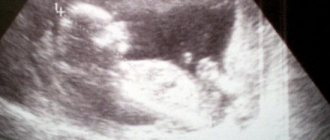- 34th week of pregnancy - how many months?
- Ultrasound
- Childbirth
- Fetus
- Feel
- Pain
- Weight
- Stomach
- Discharge
- Sex
34 weeks pregnant how many months?
34 weeks of pregnancy - just a few more weeks, and one of the most significant events in a woman’s life will take place: meeting her baby. By this time, when the countdown has already begun by almost days, many mothers are lost, calculating: 34 weeks of pregnancy, how many months it still is. If you count according to the usual “traditional” calendar, the 34th week of pregnancy is “part of” the ninth lunar month. But since in obstetric practice it is customary to count the weeks of pregnancy, “folding” them into obstetric months, the 34th week of pregnancy, according to obstetric calculations, corresponds to the end of the eighth month of pregnancy. Thus, an obstetric month consists of four weeks. Accordingly, pregnancy, according to the “obstetric” calendar, lasts 10 months.
Ultrasound
The third scheduled ultrasound should be done between 32 and 34 weeks, and usually by the 34th week of pregnancy a woman will have had an ultrasound scan. But it happens that an ultrasound at 34 weeks of pregnancy is required for indications - to assess the condition of the fetus, eliminate the risk of the baby developing hypoxia, and determine presentation. Also, an ultrasound at 34 weeks of pregnancy makes it possible to assess the condition of the placenta, identify low or polyhydramnios, and exclude the possibility of entanglement in the umbilical cord. Assessing the condition of the fetus and its location in the uterus become important indicators, based on which the doctor determines many important points for childbirth, including the possibility of childbirth occurring naturally.
Childbirth at 34 weeks of pregnancy
And although the moment for the onset of childbirth, according to the laws of nature, has not yet arrived, childbirth can still happen at 34 weeks of pregnancy due to some factors. And in this case, to the great happiness of the mother, the probability of the baby’s survival is almost one hundred percent. Thus, children born at the 34th week of pregnancy and later are no longer included in the category of “premature”, but those born prematurely. They already know how to breathe on their own, all their organs and systems are working, and therefore the baby gets a huge chance for full development. Of course, the baby will be kept in the neonatal center for some time, providing him with the necessary care. But after discharge, the baby, if born healthy and healthy, will develop in the same way as other children.
External changes at 34 weeks of pregnancy
At the thirty-fourth week of gestation, the baby already occupies almost the entire uterus while continuing to grow and stretch it. Every week he feels more and more cramped. If in the first and middle of the second trimester he could be active, move, tumble, move his arms and legs freely, now he can hardly turn from side to side in order to find a more comfortable position.
Since the child is very cramped and there is no free space, his movements and their intensity decrease. You should not be afraid of this, since such changes are quite natural. At this stage, the baby’s movements are mainly felt if he is uncomfortable and he is trying to take a comfortable position, or he does not like mommy’s position and he begins to push her so that she changes it.
Nowadays, fetal kicks often cause discomfort and pain to a woman, especially if they occur in the area between the ribs.
Beauty and accessories
Women during this period often complain of hair loss and brittle nails. This happens due to a lack of calcium in the body. Increase the consumption of fermented milk products in your diet, but do not overdo it - excess calcium, we repeat, can now lead to severe ossification of the child’s skull and reduction of the fontanel.
Try to wear cotton underwear rather than synthetic. And don't forget about the prenatal bandage, especially if you continue to lead an active lifestyle.
Research and analysis at 34 weeks of pregnancy
By the beginning of the thirty-fourth week of gestation, the expectant mother has a complete idea of how her baby is developing and whether he has any abnormalities. At the beginning of the first and second trimester, the woman underwent two ultrasound examinations of the fetus, and she also underwent a triple test, including tests for alpha-fetoprotein protein, free estriol and hCG.
Now, before each visit to the antenatal clinic, she should undergo urine and blood screenings, which will identify problems with hemoglobin and the urinary excretory system, if any.
At an appointment with a gynecologist, the woman will undergo a control weighing, measurement of blood pressure, abdominal volume and uterine fundal height. Vaginal smears will also be taken for the presence of pathogenic microflora and the fetal heartbeat will be listened to using a stethoscope.
If the doctor suspects the presence of any abnormalities, he will conduct studies of the baby’s vital signs, which include an assessment of motor activity, the baby’s breathing rate, the degree of his tone and the volume of amniotic fluid. All these screenings are performed using an ultrasound machine.
If there are medical indications at the thirty-fourth week of gestation, the expectant mother may be sent for cardiotocography, which will allow us to study the intensity of uterine contractions, as well as the fetal heart rate. In addition, some pregnant women are sent for Doppler sonography, which allows them to understand whether blood flow is normal in the placenta, the vessels of the uterus and the vascular network of the baby.
Ultrasound at 34 weeks of pregnancy
At the thirty-fourth week of gestation, an ultrasound examination is sent only if indicated. If the expectant mother has suspicious symptoms or the doctor suspects some pathology in the baby and wants to confirm his assumptions, he prescribes an ultrasound screening for the woman.
Using the resulting image on the monitor, the specialist can study the parameters of the child’s development, as well as assess the parameters of his environment. After the examination, the doctor will indicate the characteristics of the child's place, which provides the fetus with oxygen and substances necessary for its development. The condition of the placenta and its maturity is a very important point.
The qualitative and quantitative parameters of the amniotic fluid are also determined. If a woman has been diagnosed with high or low hydramnios, the specialist will give the necessary recommendations on how to relieve this problem. Using ultrasound, you can see the presence of umbilical cord entanglement and fetal presentation. Most often, at this stage the baby has already turned over and is in a head-down position, thus preparing for birth.
If for some reason the mother has not yet found out the gender of her baby, now the ultrasound specialist can provide her with this information. The most common reason for the impossibility of considering the sex of the child is its inconvenient location in the uterus.
Now this is quite easy to do, since the baby does not have enough space for pirouettes and he is in a position where his genitals are clearly visible.
Recommendations
[sc:rsa]
- Follow your usual diet, do not allow yourself to deviate from your usual routine.
- Your baby needs calcium, so drink milk or eat dairy products.
- If you feel heartburn, cook jelly and porridge more often.
- If you have not had a bowel movement for more than a day, eat prunes or dried apricots.
- Move in such a way that you do not feel short of breath. If your breathing is still impaired, it is better to stand or sit for a while until you feel better.
- Physical activity is a must. Walk in the park, swim, do yoga. Just don't bring yourself to extreme fatigue.
- The skin on the abdomen can become very itchy when stretched. Use special products for stretch marks to soften the skin and make it more elastic.
- Contrast douches will help with swelling in the legs; this will strengthen the walls of blood vessels and improve blood circulation.
- Compression socks will help your legs with varicose veins.
- Consider choosing a birth center or contract delivery with a specific physician.
- If you feel well, a calm sex life can only be beneficial, especially emotionally. Contraindications: threat of premature birth, expected twins or triplets, low placentation.
- Are you going to leave the house? Even if it’s a trip to the nearest store, take all the documents with you: passport, medical policy, exchange card, birth certificate.
- Do Kegel exercises from time to time, especially if you produce small amounts of urine when you sneeze and/or cough.
- Be attentive to the father of your child. He may now be feeling anxious about what's to come for both of you. Some fathers fear that they will not be able to care for their fragile and delicate newborn. Many suppress their sexual desires for fear of harming you and the fetus. It is important to see and resolve all these experiences in time.
- Any travel is only in case of special need. Air travel is especially dangerous for pregnant women. Pressure changes often provoke premature birth.
- Try to please and pamper yourself (just not with food) whenever possible. Read your favorite books, watch good movies, chat with your best friends.
- If you can't get enough sleep at night, make time to sleep during the day. Your norm is nine hours of proper rest.
It is important to carefully prepare for the upcoming birth. 34 weeks of pregnancy is a great time to get things in order and calmly wait for the birth of your baby.
← Week 33 Week 35 →
Read also: list of things for a newborn baby
Sex at 34 weeks pregnant
Gynecologists have a common opinion about intimate life in the thirty-fourth week. They believe that it is better to postpone sex until the baby is born. At this stage, the birth canal is being prepared for the birth process, so during intimacy there is a high probability of infection entering the uterus, which will negatively affect the health of the fetus.
But if the pregnancy is proceeding normally and the future parents are confident in each other, then intimacy does not need to be ruled out. A woman should listen to her own well-being and, based on it, decide whether she should have sex or not.
Stomach ache
During this period, during a normal pregnancy, the stomach should not hurt. There may be a pulling sensation due to the tension of the skin and ligaments holding the uterus. If you experience any pain in the abdomen, you should immediately consult a doctor - these may be signs of digestive problems, acute appendicitis, cholecystitis, constipation, poisoning, or urinary tract infections. In such conditions there will be nausea, stool disturbances and vomiting. But this happens infrequently; abdominal pain usually occurs when there are threats to pregnancy and premature birth.
You need to especially carefully monitor your well-being, if your stomach becomes stiff, your lower abdomen is tight and your lower back hurts, perhaps contractions and childbirth are starting. No less dangerous is the appearance of bloody vaginal contents, nausea, increased blood pressure, and severe swelling against the background of such symptoms.
No less dangerous are pain in the abdomen of a sharp nature without contractions with or without bleeding, with severe pallor and a disturbance in the general condition. These may be signs of placental abruption, a dangerous complication for the mother and fetus when the fetus’s nutrition is disrupted and severe bleeding occurs. In this condition, minutes count and immediate delivery is necessary.
Good to know
Why does the baby lie incorrectly in the stomach and how to turn it over?
Placental abruption: delay is unacceptable!
Premature babies: care in the maternity hospital
How to massage the perineum against tears
Placenta - during pregnancy and after childbirth: what you need to know
How does female sexuality change during pregnancy?
All texts for pages about mother and baby were kindly provided by RAMA Publishing - these are chapters from the book by Svetlana Klaas “Your Favorite Little Man from Conception to Birth”, reviewer Irina Nikolaevna Kononova, Candidate of Medical Sciences, Associate Professor of the Department of Obstetrics and Gynecology of the Ural State Medical Academy (Ekaterinburg).
What discharge should you be concerned about?
Do not forget to monitor vaginal discharge, which for this stage of pregnancy should be moderate, light milky in color, and have a slight sour smell.
The possible appearance of a slight admixture of mucus in the discharge in late pregnancy is also normal. It’s just that now the cervix has softened and is opening, allowing some of the mucous plug that covers it to separate.
Rush to the doctor immediately if you notice changes in the color, consistency or smell of the discharge. Green, yellow, purulent, curdled or mixed with flakes, foamy discharge with an unpleasant odor and itching in the genital tract indicate the appearance of a genital infectious disease, which must be treated.
Never ignore the appearance of even a small amount of blood in the discharge. This may indicate placental abruption, which is a dangerous pathology and poses a threat to the baby’s life.
Placental abruption disrupts the flow of oxygen to your baby, so if blood appears in the discharge, you should immediately call an ambulance.
Abundant, watery, yellowish discharge may indicate rupture of amniotic fluid and is a harbinger of premature birth. Having noticed them, you should immediately call a doctor and rush to the maternity hospital.
Portional leakage of amniotic fluid indicates a defect in the integrity of the membranes, which can cause intrauterine infection of the child. If you notice excessive moisture on your underwear, rush to the doctor and tell him about it.
Useful advice for future parents
If it were possible to stock up on laughter and humor for future use, it would be possible to avoid many worries and fears both during the period of waiting for the Baby and in the first year after his birth.
It is especially important that funny situations are experienced simultaneously by both the baby’s father and mother. The psychotherapeutic value of laughter is difficult to overestimate, so take advantage of every opportunity to laugh: watch a funny movie or show with comedians, download funny videos from the Internet, read funny episodes from books aloud or quote jokes, find the funny and absurd in ordinary things.
Laughter allows you to:
- relieve emotional stress, relax, rest, switch attention, look at a disturbing situation from an unusual perspective;
- strengthen emotional contact with your partner;
- make peace (one of the best family habits);
- to amuse the Baby - so many positive emotions at once!
Of course, you can laugh alone, but laughing together with your loved one increases the effect many times over. By the way, it is the Baby’s father who can take care of the fun in the house, because, according to British scientists, the male hormone testosterone, which is many times more in a man’s body, is responsible for a sense of humor.
What does the Kid experience at the moments when his mother laughs heartily and her body shakes with laughter? Most likely, the hormones of happiness and joy, endorphins, reach the Baby’s body, and pleasant waves of pleasure run through his body, and a smile appears on his face. Only human beings can laugh, and your Baby will learn this very soon - by the end of the fourth month after birth. Or maybe if he often hears your laughter now, and earlier.










